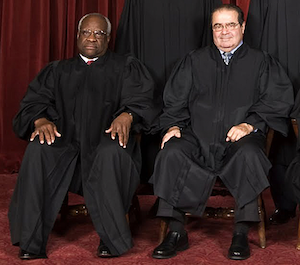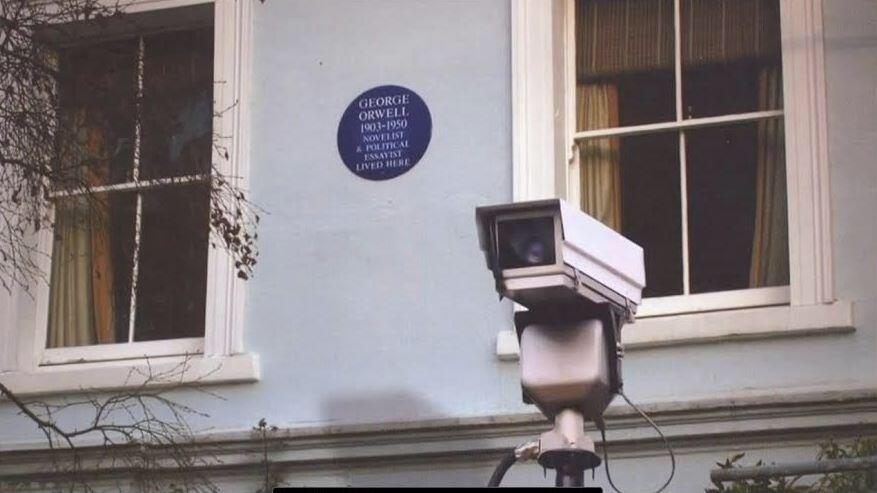 “I’m an originalist, but I’m not a nut”. This is how the Pontiff of Originalism, Justice Antonin Scalia (seated right), reportedly replied, when he was asked to compare his judicial philosophy to that of his US Supreme Court colleague, Justice Clarence Thomas (seated left). As of Thursday, Thomas J’s nutty originalism is in the ascendancy in the US Supreme Court. In New York State Rifle and Pistol Association v Bruen (23 June 2022; — US — (2022); Opinion pdf | Cornell html), the US Supreme Court held that a New York restriction on carrying firearms unconstitutionally prevented law abiding citizens with ordinary self-defense needs from exercising their Second Amendment right to keep and bear arms in public for self-defense. Referring to District of Columbia v Heller 554 US 570 (2008) (pdf) (which I critiqued here) and McDonald v Chicago 561 US 742 (2010) (pdf), the Court held that, to justify a firearms regulation, the government must demonstrate that the regulation is consistent with the Nation’s historical tradition of firearms regulation; as a consequence, the Court rejected any standard of review such as strict or intermediate scrutiny (which it described as “means-end” balancing tests). The Court identified firearms regulations that were consistent with the Second Amendment’s text and historical understanding, but held that none directly or analogically justified New York’s requirement that an applicant for a license to carry firearms outside the home had to demonstrate “a special need for self-protection distinguishable from that of the general community”.…
“I’m an originalist, but I’m not a nut”. This is how the Pontiff of Originalism, Justice Antonin Scalia (seated right), reportedly replied, when he was asked to compare his judicial philosophy to that of his US Supreme Court colleague, Justice Clarence Thomas (seated left). As of Thursday, Thomas J’s nutty originalism is in the ascendancy in the US Supreme Court. In New York State Rifle and Pistol Association v Bruen (23 June 2022; — US — (2022); Opinion pdf | Cornell html), the US Supreme Court held that a New York restriction on carrying firearms unconstitutionally prevented law abiding citizens with ordinary self-defense needs from exercising their Second Amendment right to keep and bear arms in public for self-defense. Referring to District of Columbia v Heller 554 US 570 (2008) (pdf) (which I critiqued here) and McDonald v Chicago 561 US 742 (2010) (pdf), the Court held that, to justify a firearms regulation, the government must demonstrate that the regulation is consistent with the Nation’s historical tradition of firearms regulation; as a consequence, the Court rejected any standard of review such as strict or intermediate scrutiny (which it described as “means-end” balancing tests). The Court identified firearms regulations that were consistent with the Second Amendment’s text and historical understanding, but held that none directly or analogically justified New York’s requirement that an applicant for a license to carry firearms outside the home had to demonstrate “a special need for self-protection distinguishable from that of the general community”.…
Author: Eoin
Supermarket website mistakenly lists premium whisky for £2.50 – do their inconsistent terms and conditions apply?
From today’s Guardian:
Morrisons mistakenly lists £2.50 whisky
The retailer identified the pricing error on its website before any bottles were sold
Mark Twain reputedly said: “Too much of anything is bad, but too much good whisky is barely enough.”
Online shoppers at the supermarket Morrisons came close to testing his theory when the retailer accidentally priced bottles of a Scotch whisky at just £2.50, a 93% discount from its usual price of £36. …
Whisky lovers piled in, posting their delight on social media, only to discover their big orders had been thwarted at the last minute.
The pricing error was identified by Morrisons, and due to minimum unit pricing legislation making the charge per bottle illegal, the retailer cancelled all orders before they were actioned. …
 As the image (left) from Morrisons’ current website implies, someone must have mistakenly entered £2.50 instead of the intended £25.00. But Morrisons were able to play the get-out-of-jail-free card of Scotland’s minimum unit pricing legislation (in force since 2018) prevented the offer from taking effect. Ireland has similar legislation (in force since the beginning of this year). However, if they could not have played that card, would they have been bound to sell the whisky for £2.50?…
As the image (left) from Morrisons’ current website implies, someone must have mistakenly entered £2.50 instead of the intended £25.00. But Morrisons were able to play the get-out-of-jail-free card of Scotland’s minimum unit pricing legislation (in force since 2018) prevented the offer from taking effect. Ireland has similar legislation (in force since the beginning of this year). However, if they could not have played that card, would they have been bound to sell the whisky for £2.50?…
The Aeolus Episode in Ulysses and the Freeman’s Journal: Chief Baron Palles and the law of defamation
Bloomsday 2022 is a good day to note the imminent publication the following (from the introduction and conclusion; footnotes mostly omitted):
…The Aeolus Episode in Ulysses and the Freeman’s Journal: Chief Baron Palles and the law of defamation
Christopher Palles is one of the many real Dubliners in Joyce’s Ulysses. The title refers to the Roman name of a Greek hero, Odysseus; and the novel roughly corresponds to various episodes in Homer’s Odyssey, telling the story of Dublin through the wanderings of Leopold Bloom (Homer’s Odysseus) on 16 June 1904. In the Odyssey, Aeolus, the warden of the winds, seeks to help Odysseus. In the Aeolus episode in Ulysses, Bloom visits his workplace, the Freeman’s Journal, and almost crosses paths with Stephen Dedalus (Homer’s Telemachus, the other great protagonist in Ulysses).
In the Aeolus episode, many of the novel’s characters discuss the issues of the day in the Journal’s offices. J.J. O’Molloy (a once-promising lawyer now fallen on hard times) interrupts Professor MacHugh’s discourse on the grandeur that was Rome, to ask ‘Do you know that story about chief baron Palles? … It was at the royal university dinner. Everything was going swimmingly …’.
Garda use of facial recognition technologies unnecessary and disproportionate. It may have significant chilling effects, altering how people use public and online spaces
 I am a signatory to a letter in today’s Irish Times, under the above heading. Here is a lightly-linked version, via the UCD Centre for Digital Policy (and also https://www.irishlegal.com/articles/opinion-helen-mcentee-must-place-a-full-moratorium-on-policing-facial-recognition-technologies):
I am a signatory to a letter in today’s Irish Times, under the above heading. Here is a lightly-linked version, via the UCD Centre for Digital Policy (and also https://www.irishlegal.com/articles/opinion-helen-mcentee-must-place-a-full-moratorium-on-policing-facial-recognition-technologies):
…Open Letter to the Irish Times: Experts’ Red Line on Policing Facial Recognition Technologies
Sir. – The Minister for Justice plans to expand the gardaí’s surveillance powers with policing facial recognition technologies (FRT). While some believe that using FRT may help make us safer, the undersigned experts from 7 universities and 13 NGOs in Ireland know the risks are too significant.
Policing FRT is used as a form of mass surveillance that will enable the identification and tracking of individuals without warranted suspicion. It has the ability to scan large amounts of publicly captured visual data so it can draw powerful inferences about people, the vast majority of whom would be of no interest whatsoever to the gardaí. While public safety and national security can sometimes supersede privacy rights, the intrusions of policing FRT surveillance are wholly unnecessary and disproportionate. There is a danger that the use of FRT will have significant chilling effects, altering how people use public and online spaces.
Even though this technology is available for policing, it does not mean we should use or trust it.
Dystopia and dysaguria on the fourth birthday of the GDPR’s application
Several years ago, a photo was widely shared on social media showing a CCTV camera outside 22 Portobello Road, George Orwell’s first London home. The image had been created by artist and photographer Steve Ullathorne, as part of his series Restyles of the Dead and Famous, in which he tweaked images of homes of the dead and famous. Here’s the dystopian image as shared:
 …
…
Mistaken payments and criminal liability – a cautionary tale from South Africa
I have warned many times on this blog (especially here, here, here, here, here, here, here, and here – with examples from Ireland, the UK, Australia, New Zealand, and the US) that the recipient of a mistaken payment not only has a duty to make restitution of that unjust enrichment but also faces potential criminal liability for theft if the payment is kept (and, worse, spent) rather than returned. A recent cause célèbre from South Africa provides another cautionary tale:
Sibongile Mani sentenced to 5 years’ imprisonment for theft of NSFAS funds
Walter Sisulu University (WSU) student Sibongile Mani [left] has been sentenced to five years’ imprisonment for theft relating to R14 million [€870,000] accidentally credited to her account by the National Student Financial Aid Scheme (NSFAS) in 2017.
East London Regional Court Magistrate Twanette Olivier found Mani guilty of stealing R818,000 [€51,000] of the funds.
She was only entitled to a R1,400 [€87] food allowance and was accused of failing to report when R14 million [€870,000] was credited to her account erroneously. She instead embarked on a spending spree. …
A little more background:
…Key events that led up to the sentencing and appeal of NSFAS ‘millionaire’ Sibongile Mani
…
June 2017
A technical glitch led to funding administrative company Intellimali erroneously transferring R14m into Mani’s account.
Frances Haugen, Facebook whistle-blower, in conversation with Jess Kelly, tech correspondent with Newstalk fm, in the Long Room Hub, Trinity College Dublin, at 5pm on Monday 21 March 2022

Frances Haugen, Facebook whistle-blower, will be in conversation with Jess Kelly, tech correspondent with Newstalk fm, on Monday, 21 March 2022, 5–6pm, in the Neill Lecture Theatre, Trinity Long Room Hub Arts & Humanities Research Institute, Trinity College Dublin (map here).
About the Conversation
 Frances Haugen is a data engineer, and formerly a product manager with Facebook. In 2021, she disclosed tens of thousands of Facebook’s internal documents to the US Securities and Exchange Commission, and these documents formed the basis of the Wall Street Journal‘s Facebook Files investigation. In October 2021, she told the US Congress that Meta’s “leadership know how to make Facebook and Instagram safer, but won’t make the necessary changes because they have put their astronomical profits before people”. She has testified to the US Congress, the European Parliament, the UK Parliament, and the Oireachtas, that government regulation of Meta is increasingly necessary.
Frances Haugen is a data engineer, and formerly a product manager with Facebook. In 2021, she disclosed tens of thousands of Facebook’s internal documents to the US Securities and Exchange Commission, and these documents formed the basis of the Wall Street Journal‘s Facebook Files investigation. In October 2021, she told the US Congress that Meta’s “leadership know how to make Facebook and Instagram safer, but won’t make the necessary changes because they have put their astronomical profits before people”. She has testified to the US Congress, the European Parliament, the UK Parliament, and the Oireachtas, that government regulation of Meta is increasingly necessary.
In her conversation with Jess Kelly, tech correspondent with Newstalk fm, Frances will discuss what changes Meta can make, and what regulations legislators can introduce, to make platforms safer.
PLEASE BOOK HERE. Numbers are limited, so registration is essential.…
Convenience as consideration? Payment for good consideration as a defence to a claim to restitution for unjust enrichment
 In Barclays Bank Limited v Simms [1980] QB 679, 695, Goff J held that a claim for restitution on the grounds of mistake would fail, inter alia, if
In Barclays Bank Limited v Simms [1980] QB 679, 695, Goff J held that a claim for restitution on the grounds of mistake would fail, inter alia, if
the payment is made for good consideration, in particular if the money is paid to discharge and does discharge a debt owed to the payee (or a principal on whose behalf he is authorised to receive the payment) by the payer or by a third party by whom he is authorised to discharge the debt … [emphasis added]
We have already seen an interesting US case of the particular example of the three party case [update: the appeal is noted here]. Now comes news of an interesting US case of the italicised general example of payment made for good consideration.
In Pincus v American Traffic Solutions, Inc, Pincus was photographed going through a red light (similar to the one in the photo, right), and he paid a penalty to American Traffic Solutions, Inc (ATS), made up of the statutory penalty and an additional fee for the convenience of paying online rather than by mail. He brought a putative class action (pdf) against ATS in Federal Court, alleging that several Florida statutes barred ATS from charging the convenience fee and that ATS was unjustly enriched by retaining it.…
